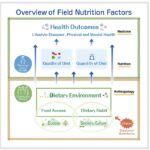「食べること」には、単に必要な栄養摂取だけでなく、食習慣、文化、食品入手など、さまざまな側面があります。フィールド栄養学では、食と健康の疫学調査に加え、文化人類学的な視点で、地域の食、文化的背景、特性などを探求します。私たちは、近年急増している生活習慣病などに着目し、それぞれの地域に応じた「食からのアプローチ」を通して健康問題の解決を目指しています。
Eating is not only about obtaining sufficient nutrition to live, but it also includes a wide aspect of factors, such as eating habits, culture, and environment. Current academic classes in nutrition have focused more on nutritional intake or the pathology of nutrient metabolism rather than the relationship between eating and health. Moreover, cultural background such as the traditional eating culture and its change, economic situation and food availability are evaluated in the community. Field nutrition aims to address lifestyle diseases by increasing understanding of eating situations and intervening with consideration of the local culture and environment.

フィールド栄養学では、栄養学の調査手法とともに、集団の健康状態を把握する疫学的調査、地域の特性を探求する文化人類学的調査を用います。栄養調査では、基本的な栄養アセスメントとともに、フィールドでも簡易に食事摂取を把握することができる「京都式食多様性スコア11-item Food Diversity Score Kyoto (FDSK-11)」*を用いています。
Methodology of Field Nutrition is mainly based on Epidemiology, Nutrition and Anthropology. In addition to the basic nutritional assessment, a newly developed tool, the 11-item Food Diversity Score Kyoto (FDSK-11) *has been used. For the quantity of diet, 24 hour recall method is applied to know the actual nutrition intake. Moreover, the cultural background of the community is evaluated; this background includes the traditional eating culture and its changes, the economic situation, and food availability. By revealing the nutrition and lifestyle background, and environmental factors related to health outcomes, this multi-disciplinal assessment will be useful to identify the actual situation of human eating in the community setting.
*京都式食多様性スコア(FDSK-11) は、フィールドでも簡易に使えるように考案された、食品摂取頻度を問う質問票です。11食品群の一週間の摂取頻度を4択で問い、スコア化することで、どれだけ多様な食品を摂取できているかという、「食事の質」を評価します。各食品群の摂取頻度は、その人の「食習慣」もあらわします。詳細な思い出しや定量の難しい高齢者の方にも、負担の少ない食事調査法です。
>> 京都式食多様性スコアの質問票をご利用になりたい方は、ProfileページのContact にご連絡ください。
*11-item Food Diversity Score Kyoto (FDSK-11); Simple screening tool to evaluate “dietary quality” by answering the questionnaire about frequency of food intake (11 food groups) over a week. This questionnaire is developed to assess nutritinoal intake easily in the field, without complex mesuring or remembering question for the elderly people. >>If you are interested, please contact us via “contact” at the profile page. (English, Spanish, Thai, Chinese version are available)
References
- Kimura Y, Wada T, Ishine M, et al. (2008) “Food diversity is closely associated with activities of daily living, depression, and quality of life in community-dwelling elderly people.” J Am Geriatr Soc. 57, 922-924.
- Kimura Y, Okumiya K, Sakamoto R, et al. (2009) “Comprehensive geriatric assessment of elderly highlanders in Qinghai, China IV: comparison of food diversity and its relation to health of Han and Tibetan elderly.” Geriatr Gerontol Int. 9,359-365.
- Kimura Y, Wada T, Okumiya K, Ishimoto Y, Matsubayashi K, et al. (2012) ‘‘ Eating alone among community-dwelling Japanese elderly: association with depression and food diversity.” J Nutr Health Aging. 16(8), pp.728-31.
